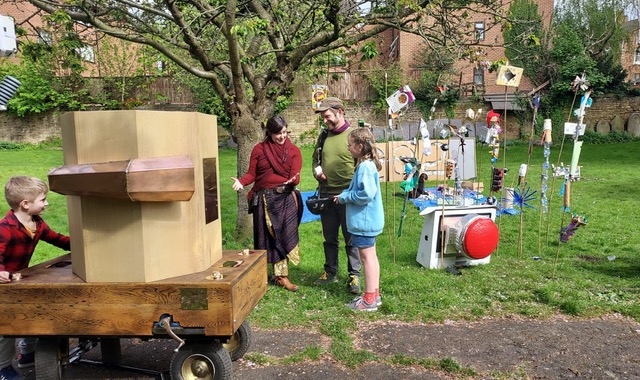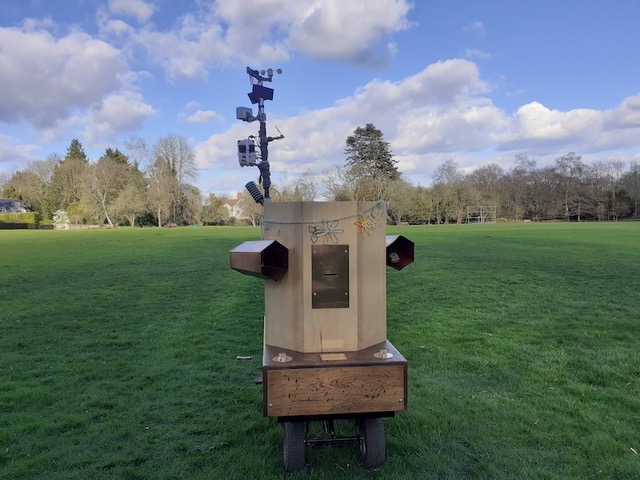- Rachel Jacobs
- Jul 30, 2024
- 5 min read
Updated: Aug 2, 2024
Emerging Voices is pleased to present an update from Rachel Jacobs on her journey with Future Machine, an interactive artwork designed to encourage conversation and action on our ongoing climate crisis. For background and more stories, see Rachel's work in our Archives.
Future Machine: When The Future Comes, 2024
Future Machine is a deliberately heavy, cumbersome, technologically complex, slow and somewhat mysterious being. An interactive artwork, it prompts those who meet it to consider the future and be a witness to change. In some sense, Future Machine might be thought of as a mythical creature, a totem, a being that appears as if from nowhere as the seasons change. A child said it looks like a witch. It captures the imagination as people stroke it and laugh at its wobbly, clunky movements. Many are drawn to it, returning each year when it makes its appearance.
2024 has been a busy year for Future Machine and the artists of 'When the Future Comes Project’. In 2024, after a year of no funding, we received much needed money from the Arts Council of England to continue this ambitious 30 year project. As this longitudinal project evolves, we are aware that each year will be different. Sometimes we’ll expand, sometimes we’ll hardly manage to be present at all – as in 2020 and 2023. A cardboard effigy of Future Machine may appear or we may just walk by, filming and taking photos. Perhaps we’ll simply gather with a few people around a tree.
As part of this year's funding commitment, we explored ways to tell the wider story of When the Future Comes, based on the five places across England where Future Machine has appeared: Christ Church Gardens, a memorial garden in Nottingham; Finsbury Park, a large urban park in north London; the Windermere-Leven waters in rural Cumbria; Peppard, an Anglo-Saxon village in Oxfordshire; and Cannington, Somerset, an ancient village, now becoming a commuter town for Hinkley Point C Nuclear Power Station.
We have begun to tell the story through objects and moments in time, captured by the collaborating artists in each place. We have created a 'Cabinet of Curious Places' to hold the objects and stories. This ‘cabinet’ can unfold as an exhibition, enabling people to follow trails and threads and scan QR codes. A large banner provides a backdrop to the cabinet, representing this journey with a map, along with a key to the places represented by hand embroidered QR codes.
The aim is to make sense of things that hold these five places together, that reveal their uniqueness, their beauty and peculiarities. This has been a challenging process, and it continues to shape itself. Most probably, we will be unable to tell a coherent story of these sites. Yet Future Machine appears in each place once a year, its presence binding the sites together over time. The cabinet has just been exhibited at Derby Cathedral as part of a larger exhibition called 'Our Stories Are Wild', featuring artistic works exploring connections with nature, curated by one of the collaborating artists Caroline Locke.
THIS YEAR’S JOURNEY
First, we took a walk along the lanes of Peppard, meeting families leaving the primary school at the end of the day on the Spring Equinox. Over 50 people came to the Cricket Pavilion on a Sunday afternoon to celebrate the end of winter and the Spring Equinox. A break in the wet weather brought us a beautifully warm day. People met Future Machine, listened to Oxfordshire's collaborating artist Juliet Robson's sound works and toasted the coming of Spring 2024 with damson gin. Some of us went with Future Machine to the community-managed Unicorn Pub to watch the sun go down.
Soon thereafter, Future Machine returned to Nottingham to meet under blossoming trees. This year brought the wettest Spring ever recorded in Britain. The trees were not looking healthy. They had blossomed a full month earlier than in 2018, the first time we met there. When we gathered, the blossoms were nearly gone, pink petals on the ground. We celebrated the change in heart of the council to cement over the rose garden and place cement blocks with chess boards on them, covered with words celebrating nature. They agreed to move this to the playground and instead plant six more cherry trees.
With the local youth service, the Toy Library, and the local Mellers Primary School, we made plants and creatures from rubbish and waste. We surrounded the cherry tree with these funny human-rubbish-made beings. People met Future Machine, spoke to the future and listened to messages from the past. Nottingham's collaborating artist, Frank Abbott, filmed participants walking around the tree with their beings made of rubbish. A most memorable moment was when Future Machine played a message from Oxfordshire, made a couple of weeks earlier, full of bird song. When the message stopped playing, there was silence, sudden awareness of the absence of birds singing out the Spring in these inner city gardens.
In July, we made Future Machine's annual summer appearance at Cannington Primary School in Somerset. We met with every class, each group coming out to the playground where the collaborating artist Caroline Locke had planted trees with the school in 2022. Each class was invited to write a poem to speak to the future.
These poems were based on Caroline's concept of a Tree Crier. Based on the old Town Criers, the children dressed in costume, and rang Caroline's tree bell. The bell is tuned to the frequency of the Cannington hornbeam tree Caroline herself planted on the village playing fields, when she was a pupil at the school in the 1970s. Every child had a chance to turn Future Machine’s handle, push the lever, speak to the future. The teachers were given the stories printed out of Future Machine. These will serve as prompts to discuss climate and environmental change, the importance of planting trees and of being a witness to when the future comes.
WHAT’S NEXT?
We are now preparing for Future Machine to go to Cumbria at the end of Summer. We have much to think about. How can we sustain the project into next year? What next for the Cabinet of Curiosities? Can we continue to move such a large, heavy object as Future Machine around the country as we all get older? How can we reduce the carbon footprint of the journeys between each place?
As with our need to change our ways of being and reconnect with the natural world (that we are at once part of and have made a false separation from), committing to these five places with this heavy artwork is difficult. It is at various times painful, wonderous and inspiring. It gives us artists hope, and appears to inspire hope in those who encounter it.
Most of all, it seems to inspire change. In Peppard, people say they now look forward to gathering together after the long winter. A new collaboration is evolving to create an accessible path through the local woods, which we hope to be able to traverse at the next Spring Equinox. In Nottingham, people are giving attention to the previously overlooked memorial gardens and new trees are being planted. In Cannington, trees have also been planted and the school is working on innovative ways to think about the environment. In Cumbria, Future Machine connects to a growing awareness of access to and quality of the waters. In London, Future Machine's collaborating artists have been invited to facilitate an ongoing arts, ecology and music residency, alongside a community gardening project in the most derelict corner of the large, urban Finsbury Park.

To find out more about Future Machine's next appearances in Cumbria in September and Finsbury Park in November visit: https://www.whenthefuturecomes.net/
To find out more about The Commons Residency and Community Gardening Project in Finsbury Park visit: https://www.whenthefuturecomes.net/residency/








